Which beets are healthier, raw or boiled: compare composition and medicinal properties
Beetroot is a well-known and beloved vegetable by many. Ancient healers spoke about the benefits of this root vegetable. Not yet knowing its chemical composition, people realized that the vegetable had healing properties and grew it as a medicinal plant.
Eating beets raw ensures that all nutrients enter the body in full. But boiled root vegetables appear on our table much more often. From the article you will learn what diseases boiled and raw beets are useful for and whether there are contraindications to their use.
The benefits and harms of beets
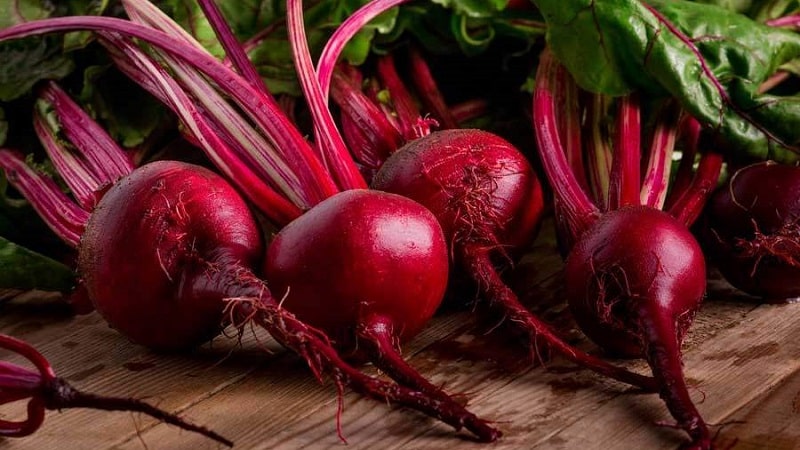
Beets are grown in garden beds and large plantations. Its beneficial properties have been proven not only by traditional medicine, but also by modern research.
Interesting! Beetroot became a cultivated vegetable back in the 1st-2nd millennium BC. e. in Mediterranean countries. At that time, this root vegetable was considered medicinal and was always eaten raw. It came to Kievan Rus only in the 10th century.
The root vegetable has many advantages:
- unpretentiousness when growing;
- pleasant taste and bright color;
- long-term storage;
- opportunity prepare different ways.
Raw
When consumed raw, beets:
- has vasodilating, sedative, diuretic and antisclerotic properties;
- normalizes heart function, lowers blood pressure, strengthens the walls of blood vessels and improves blood circulation;
- helps with weight loss;
- fights hemorrhoids;
- useful for anemia;
- cleanses the liver.
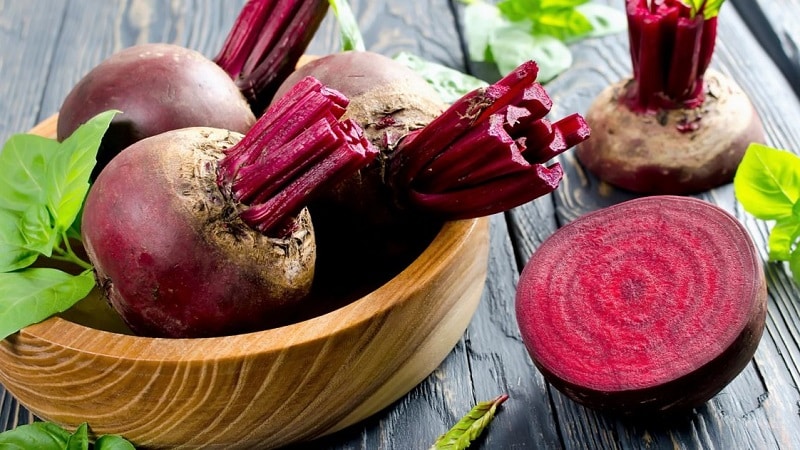
Boiled
After cooking, this vegetable does not lose its beneficial properties:
- recommended for people with diseases of the gastrointestinal tract, because it restores the inflamed gastric mucosa, gently cleanses the intestines and liver, and treats constipation;
- removes harmful bacteria and toxins;
- normalizes metabolism, helps get rid of excess fat, therefore it is considered a dietary product;
- useful for anemia, quickly replenishes blood loss, increases hemoglobin levels;
- rejuvenates the body due to the presence of antioxidants;
- stimulates the immune system.
Not everyone likes the taste of boiled beets, but many enjoy them as part of various dishes.
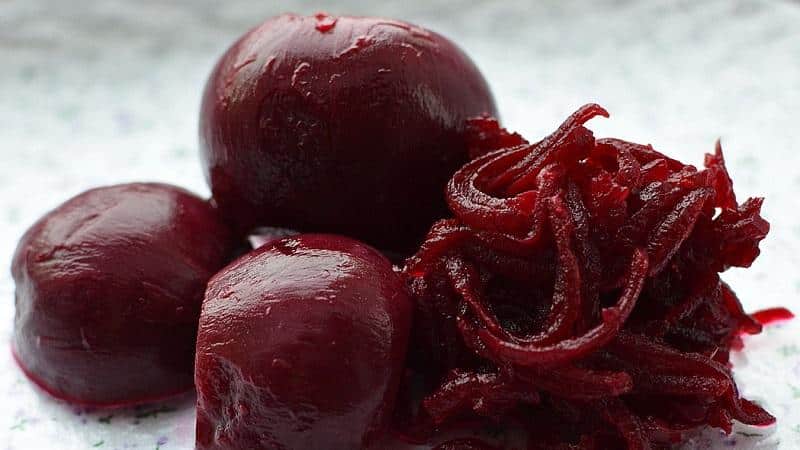
Which beets are healthier: raw or boiled?
It is believed that natural products lose their usefulness after processing. Cooking, stewing, frying, and salting destroy most of the nutrients. Beetroot is an exception vegetable.
Composition and properties of raw and boiled beets
The composition of raw and cooked is almost the same. Calorie content - from 40 to 45 kcal. Depending on the varieties she hesitates: the more Sahara, the higher the calorie content.
The chemical composition of beets is presented in the table:
| View | Proteins, % | Fats, % | Carbohydrates, % | Water, % |
|---|---|---|---|---|
| Raw | 1,7 | 0,2 | 5,6 | 3,2 |
| Boiled | 1,5 | 0,1 | 9 | 3,1 |
The data from the table confirms that after heat treatment the chemical composition of beets, and therefore their properties, changes little. This is one of the few products that remains healthy after cooking.
Vitamins and microelements of raw and boiled beets
The composition of vitamins and microelements is presented in the table.
| Vitamins | Raw beets | Boiled beets |
| Vitamin A, retinol | 0.02 mg | 0.02 mg |
| B1, thiamine | 0.02 mg | 0.02 mg |
| B2, riboflavin | 0.04 mg | 0.03 mg |
| B3, niacin | 0.4 mg | 0.3 mg |
| B5, pantothenic acid | 0.5 mg | 0.4 mg |
| B6, pyridoxine | 0.06 mg | 0.1 mg |
| B9, folic acid | 0.013 mg | partially destroyed |
| C, ascorbic acid | 10 mg | partially destroyed |
| E, tocopherol | 0.1 mg | 0.1 mg |
Complete destruction of folic and ascorbic acids occurs if the vegetable is cooked incorrectly: the pan lid is open, the root vegetable is cut into pieces, the peel is damaged. The microelements included in its composition are preserved after heat treatment.
Interesting! Beets have a rich, vibrant color thanks to betaine. This organic substance was discovered by the German chemist Scheibler. In Latin, “beet” sounds like beta, hence the name “betaine”.
Per 100 g of beets there are:
- iron - 1.4 mg;
- iodine - 7 mcg;
- cobalt - 2 mcg;
- lithium - 60 mcg;
- manganese - 0.66 mg;
- copper - 140 mcg;
- molybdenum - 10 mcg;
- nickel - 14 mcg;
- rubidium - 453 mcg;
- selenium - 0.7 mcg;
- strontium - 8.4 μg;
- fluoride - 20 mcg;
- chromium - 20 mcg;
- zinc - 0.425 mg;
- zirconium - 0.08 mcg.
A deficiency of these microelements leads to disruption of all body systems.
Use for diseases
Beets are unique in that after any heat treatment - boiling, stewing, baking - they become tastier and softer. It is used for treatment and prevention of many diseases.
Gastrointestinal tract
The raw product should be used with caution. With excessive use of acid in beet juice disrupt the functioning of the digestive system.
Important! Freshly squeezed beet juice is drunk 2 hours before meals.
Boiled root vegetables improve the functioning of the entire digestive system. Betaine restores liver cells. Dietary fiber and pectins help the body cleanse the intestines of toxins. The boiled product is useful for gastritis with normal and low acidity.
Diabetes
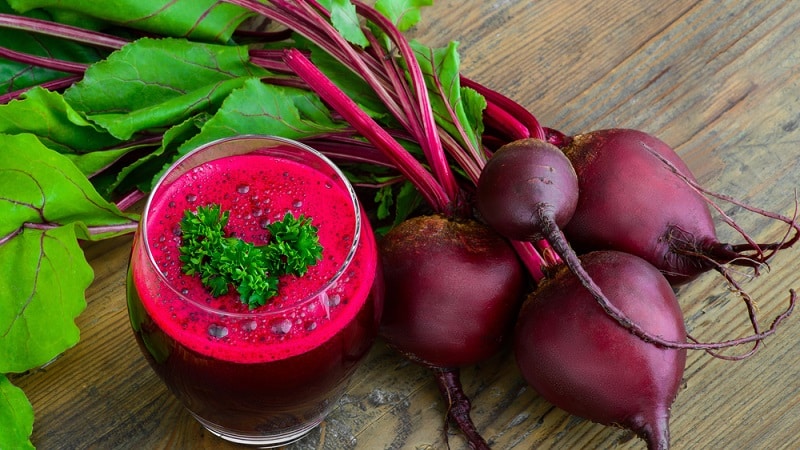 Raw beets contain a lot of sucrose, which is harmful for diabetics. Even if you follow a diet, it disrupts your metabolism, which leads to complications. Fans of this vegetable in its raw form should consult their doctor before consuming it.
Raw beets contain a lot of sucrose, which is harmful for diabetics. Even if you follow a diet, it disrupts your metabolism, which leads to complications. Fans of this vegetable in its raw form should consult their doctor before consuming it.
Boiled beets are allowed. Diabetics of types 1 and 2 consume it while following a dietary diet. It has a positive effect on blood vessels and the heart, regulates metabolism and hemoglobin levels.
Cardiovascular
Raw beets are beneficial due to their nitrite content. This group of compounds dilates blood vessels and lowers blood pressure.
Boiled also thins the blood, cleans blood vessels, improves heart function, normalizes blood circulation, and fights bad cholesterol.
Women's
Boiled and raw beets help women cope with many problems:
- during menopause, normalizes the cycle;
- during menstruation helps restore blood loss;
- normalizes metabolism;
- if there is a lack of folic acid, it helps to cope with premenstrual syndrome.
During pregnancy, this product:
- helps cope with depression;
- normalizes intestinal motility and gently treats hemorrhoids;
- has a diuretic effect and fights swelling;
- prevents anemia.
Overweight women include this product in their menu because it is low in calories. Fiber helps remove harmful substances. The process of losing weight is easier.
Men's
Vitamins B3, B5, E and C nourish the brain and stimulate the pituitary gland, which is responsible for a man’s sexual desire. Vitamins A, B, E, zinc and selenium increase male strength. Beta-carotene contained in beets prevents the formation of tumors, such as prostate adenoma.
The root vegetable rejuvenates the body and provides a high level of potency for many years.
Children's
Raw beets are contraindicated for infants. The high content of fruit acids irritates delicate mucous membranes. There is a high risk of an allergic reaction.
Boiled vegetables gently and painlessly cleanse the intestines and are necessary for anemia and iodine deficiency. During periods of vitamin deficiency, boiled beets replenish vitamin deficiency in the child’s body.
How to eat raw and cooked beets
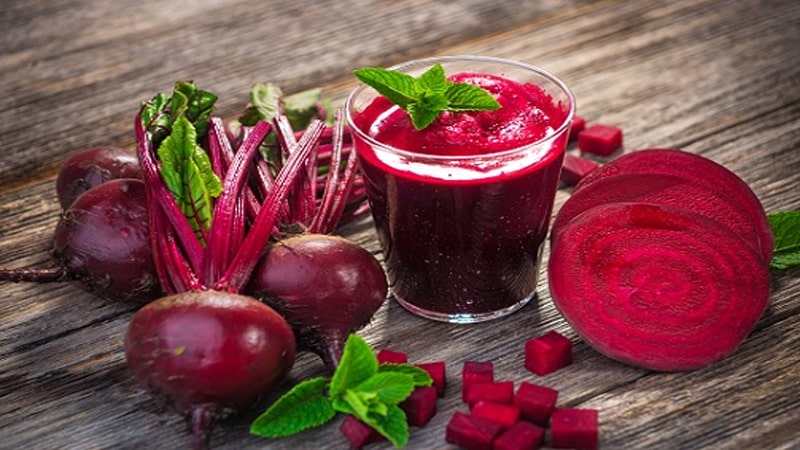
The main rule when consuming any product is compliance with the norm. Drink no more than 1 tbsp of beet juice. per day with breaks. It contains acids that irritate the mucous membranes of the digestive organs. Contraindicated for children under one year of age.
Doctors advise drinking beet juice with the addition of other vegetables and fruits: carrots, pumpkins, apples. After preparation, the juice is infused in the refrigerator for 2-3 hours.
Important! The bright color of the vegetable warns of the risk of an allergic reaction.
The usual rate of consumption of boiled beets is 200-250 g per day for adults, for children - half as much.
As a vegetable complementary food, it is given to children aged 6-8 months, added to other vegetables. Be sure to take it during the morning intake to monitor the reaction of the child’s body. 1-2 tsp is enough. After a year, dishes with beets are introduced into the children's diet: borscht, mashed potatoes, side dishes, salads.
When preparing boiled vegetables, follow these rules:
- Boil in skin and whole;
- in a small amount of water;
- with closed lid;
- don't overcook.
The best processing method is baking. It preserves the maximum of nutrients.
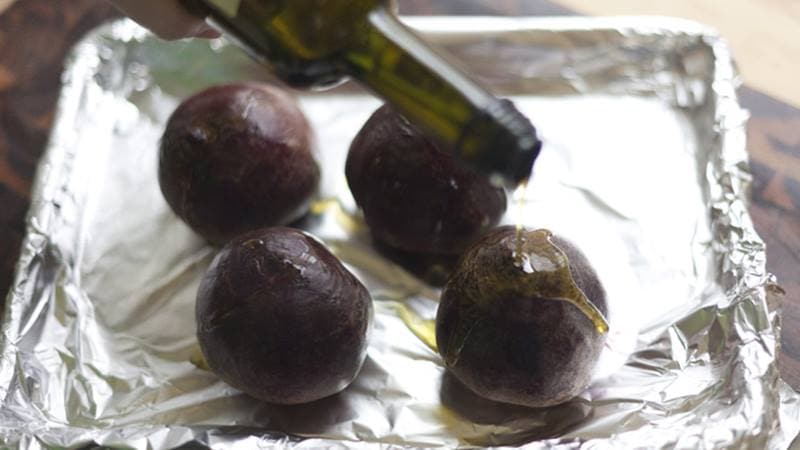
For whom it is contraindicated
Raw beets are contraindicated for:
- gastritis with high acidity;
- proneness to allergies;
- urolithiasis;
- diabetes mellitus;
- renal failure;
- low pressure.
Boiled root vegetables should not be consumed if:
- weak intestines;
- osteoporosis;
- proneness to allergies;
- acute pancreatitis.
Conclusion
It is better to eat boiled or raw beets - everyone decides individually. With proper heat treatment, the vegetable does not lose its beneficial properties, so boiled is not inferior to raw. The healing properties of the root vegetable appear with moderate consumption.